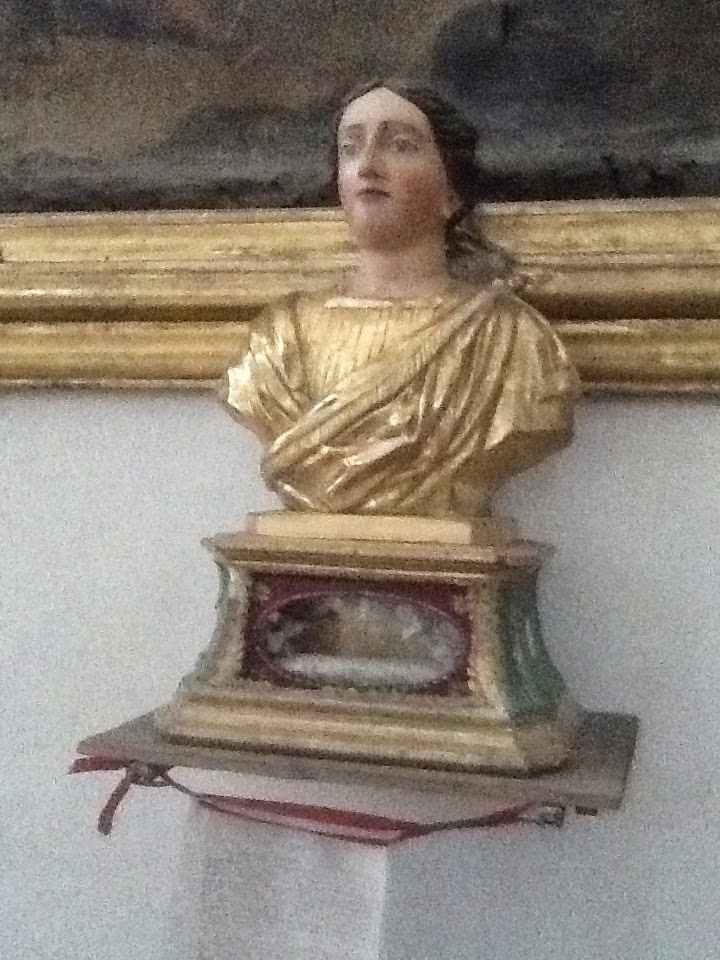St Perpetua
A young educated woman of Carthage was imprisoned with her baby and her pregnant servant,
Felicitas, for refusing to renounce their Christian faith. Allegedly Felicitas' primary worry was that she would miss the group martyrdom as law forbade the execution of pregnant women.
However the baby was born and the martyrdom of the women and a few male
colleagues took place at the military games in celebration of the Emperor Geta's birthday.
The Christians were led into the amphitheatre and at the demand of the crowd were
scourged by gladiators. Then a boar, a bear, and a leopard were
set on the men,
and a wild cow upon the women. After being wounded by the wild
animals,
they gave each other the 'kiss of peace' and were then slain with the sword.
The Passion of St. Perpetua, St. Felicitas, and their Companions written in 302, is one of the oldest and most notable early Christian texts, in part because it was written by a woman with a strong feminist perspective who included her observations on gender issues.
It survives in both Latin and Greek, and purports to contain the actual prison diary of Perpetua. Scholars generally believe that it is authentic although their research concludes that it has been edited by a male writer who states he was an eyewitness and has added his own accounts of the martyrs' suffering and deaths.
The text describes Perpetua’s
death as follows; "But Perpetua, that she might have some taste of pain,
was pierced between the bones and shrieked out; and when the
swordsman's hand wandered still (for he was a novice), herself set it
upon her own neck. Perchance so great a woman could not else have been
slain (being feared of the unclean spirit) had she not herself so willed it" (xix).
Emperor Geta, however, did not get off lightly either.
His elder brother, Caracalla, always had jealousy issues despite the family's
projected public image of a happy and functional family, and he ordered Geta's assassination.
projected public image of a happy and functional family, and he ordered Geta's assassination.
Like Perpetua, Geta was killed by the hand of Roman soldiers at the age of 22 years.
Her feast day, the date of her martyrdom, is obviously the same as his birthday, the 7th of March.
Her feast day, the date of her martyrdom, is obviously the same as his birthday, the 7th of March.
Caracalla ordered his brother's name to be removed
from all inscriptions- coins, plaques etc. He also took the opportunity
to get rid of his political enemies on grounds of conspiracy and around 20,000 men and women were killed or proscribed during this time.
Of course nothing is sacred.
The relic of St. Perpetua, which would have been displayed behind the glass on her reliquary
was stolen by some infidel or other.
The relic of St. Perpetua, which would have been displayed behind the glass on her reliquary
was stolen by some infidel or other.
For me this is a kind of ironical object d'art, however, I guess there is simply no broom cupboard
in the church as the Blessed Virgin Mary is stored in a disused confessional box.

In the car park, a map of the area showing the various locations of
the different kinds of resistance activity.
Fountain in Place Francoise Beraud.
Francoise Beraud was a conseiller général
de Barrème who died of exhaustion in Buchanwald in 1940.
Behind the fountain, across the tarmac, Louise waits in the sunshine for my return.
A man in a purple t-shirt is no doubt admiring her EFI.
(electronic fuel injectors)
de Barrème who died of exhaustion in Buchanwald in 1940.
Behind the fountain, across the tarmac, Louise waits in the sunshine for my return.
A man in a purple t-shirt is no doubt admiring her EFI.
(electronic fuel injectors)





No comments:
Post a Comment